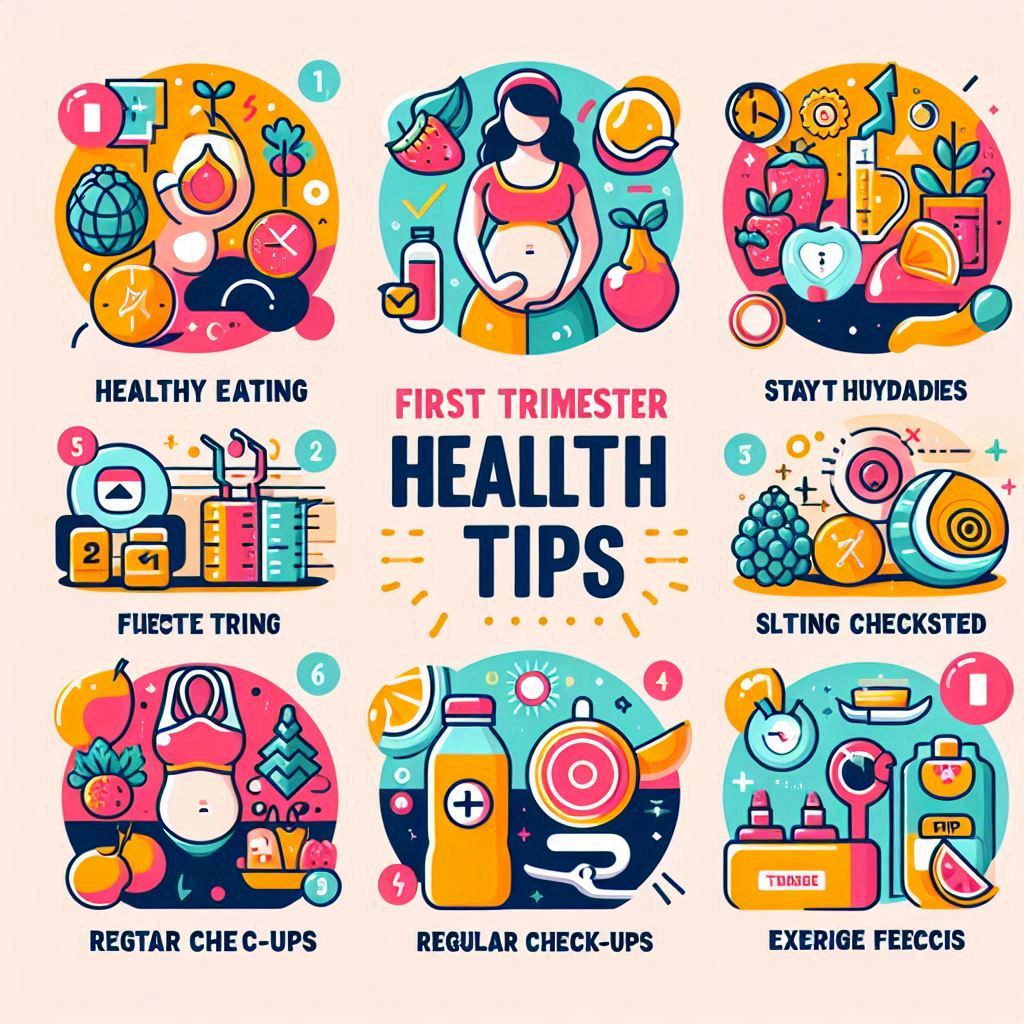Congratulations on your pregnancy! The first trimester is an exciting yet challenging time filled with physical changes, emotional shifts, and important decisions about your health. Understanding how to take care of yourself during this crucial stage can set the tone for a healthy pregnancy. In this comprehensive guide, we’ll delve into essential first trimester health tips, covering what you should embrace and what to avoid, common symptoms, and lifestyle adjustments to ensure both you and your baby thrive.
Understanding the First Trimester
What is the First Trimester?
The first trimester of pregnancy lasts from week 1 to week 12. This period is vital for your baby’s development, as it’s when most major organs and systems are formed. During this time, you may experience various physical and emotional changes, some of which can be surprising.
Key Changes in Your Body
During the first trimester, your body undergoes significant transformations due to hormonal shifts. Here are some key changes you might notice:
- Hormonal Fluctuations: Increased levels of hormones like hCG, progesterone, and estrogen are crucial for maintaining pregnancy but can also lead to fatigue and mood swings.
- Physical Symptoms: Common early signs include nausea, breast tenderness, fatigue, and frequent urination. Some women may also experience heightened sense of smell or food aversions.
- Weight Changes: While weight gain is typically minimal in the first trimester (about 1-5 pounds), each pregnancy is unique. It’s essential to focus on healthy eating rather than the scale.
Understanding these changes can help you navigate your first trimester with greater ease and confidence.

First Trimester Health: Essential Do’s for a Healthy Start
Schedule Your Prenatal Appointments
One of the first and most important steps you should take is to schedule your prenatal appointments. Early and regular check-ups are vital for monitoring both your health and your baby’s development.
- What to Expect: During your initial visit, your healthcare provider will perform a physical exam, discuss your medical history, and may order blood tests or ultrasounds. They will also provide guidance on prenatal vitamins and nutrition.
Prioritize a Balanced Diet
Nutrition is a cornerstone of a healthy pregnancy. Focus on incorporating nutrient-rich foods into your diet to support both your health and your baby’s development.
Recommended Foods:
- Folic Acid: Vital for preventing neural tube defects. Sources include leafy greens, beans, and fortified cereals.
- Iron: Supports increased blood volume. Good sources include lean meats, spinach, and lentils.
- Calcium: Important for developing bones and teeth. Dairy products, almonds, and broccoli are excellent sources.
Sample Meal Plan:
| Meal | Food Items |
|---|---|
| Breakfast | Oatmeal with berries and almonds |
| Snack | Greek yogurt with honey |
| Lunch | Quinoa salad with chickpeas and veggies |
| Snack | Sliced apple with peanut butter |
| Dinner | Grilled chicken with steamed broccoli and brown rice |
Read More to Know First Trimester Health Tips : Top Tips for a Healthy 1st Trimester
Incorporate Safe Exercise
Staying active is essential for maintaining overall health during pregnancy. Regular exercise can help reduce stress, improve circulation, and prepare your body for labor.
First Trimester Health: Recommended Activities
- Walking: A low-impact exercise that can easily be incorporated into your daily routine.
- Prenatal Yoga: Helps with flexibility, strength, and relaxation.
- Swimming: Provides a full-body workout while being gentle on your joints.
Always consult with your healthcare provider before starting any new exercise program, especially if you have any concerns.
Focus on Mental Health
Mental well-being is just as crucial as physical health during pregnancy. Hormonal changes can lead to mood swings, anxiety, and stress. Here are some tips to help maintain mental health during this period:
- Mindfulness and Meditation: Practices like meditation can help you stay centered and reduce stress.
- Support System: Surround yourself with supportive family and friends who can provide encouragement and companionship.
- Counseling: If you find yourself feeling overwhelmed, consider speaking with a therapist who specializes in prenatal mental health.
Don’ts to Avoid in the First Trimester
Avoid Harmful Substances
Protecting your baby from harmful substances is crucial during pregnancy. Certain foods, drinks, and medications can pose risks.
Foods and Drinks to Avoid:
- Alcohol: No amount of alcohol is considered safe during pregnancy.
- Caffeine: Limit intake to about 200 mg per day (equivalent to one 12-ounce cup of coffee).
- Raw or Undercooked Foods: Such as sushi, eggs, and meats, which can carry bacteria.
Don’t Ignore Warning Signs
Your body will send signals if something isn’t right. It’s essential to listen and respond appropriately.
Warning Signs:
- Severe Cramping: Can indicate a potential miscarriage or ectopic pregnancy.
- Bleeding: While light spotting can be normal, heavy bleeding requires immediate medical attention.
- Severe Headaches or Vision Changes: Could indicate high blood pressure or other complications.
Read More: First Trimester Tips: What to Expect in the First 13 Weeks of Pregnancy
Don’t Overexert Yourself
While staying active is important, avoid overexertion. Know your limits and take breaks as needed.
Signs You Need Rest:
- Persistent fatigue
- Shortness of breath
- Dizziness or faintness
Avoid Stressful Situations
Stress can negatively impact both your health and your baby’s development. Consider ways to create a calming environment.
- Relaxation Techniques: Deep breathing, prenatal yoga, and reading can help manage stress.
- Limit Exposure to Negativity: Surround yourself with positive influences and limit news consumption if it causes anxiety.

Common First Trimester Symptoms and How to Manage Them
Morning Sickness
Morning sickness affects about 70% to 80% of pregnant women, typically occurring during the first trimester.
What Causes Morning Sickness?
Morning sickness is believed to be caused by hormonal changes, particularly the increase in hCG and estrogen. While it can be challenging, there are ways to manage it.
Tips for Alleviating Symptoms:
- Eat Small, Frequent Meals: Keeping your stomach from being empty can help reduce nausea.
- Stay Hydrated: Drink plenty of fluids; ginger tea can be soothing.
- Avoid Triggers: Identify and steer clear of foods or smells that worsen your nausea.
Fatigue and Sleep Changes
Fatigue is a common complaint during the first trimester due to hormonal changes and the body’s increased energy demands.
Tips for Improving Sleep Quality:
- Establish a Routine: Go to bed and wake up at the same time each day.
- Create a Comfortable Environment: Keep your bedroom cool, dark, and quiet.
- Limit Screen Time Before Bed: The blue light from devices can interfere with your ability to fall asleep.
Mood Swings
Emotional fluctuations are common during pregnancy due to hormonal shifts. You may experience feelings of joy, anxiety, or frustration.
Coping Strategies:
- Journaling: Writing down your thoughts can help process emotions.
- Open Communication: Discuss your feelings with your partner or friends. Sharing can lighten your emotional load.
- Engage in Activities You Enjoy: Whether it’s reading, crafting, or spending time outdoors, find what brings you joy.
Lifestyle Adjustments for First Trimester Health
Create a Supportive Environment
A supportive environment is essential for a healthy pregnancy. Here’s how to cultivate one:
- Involve Your Partner: Discuss expectations and responsibilities.
- Seek Out Community: Join prenatal classes or online groups for expectant parents.
Stay Informed About Pregnancy
Knowledge is power. Equip yourself with the right resources to navigate your pregnancy confidently.
- Recommended Reading:
- What to Expect When You’re Expecting by Heidi Murkoff
- The Mayo Clinic Guide to a Healthy Pregnancy
- Attend Prenatal Classes: These classes can provide valuable information about childbirth, breastfeeding, and newborn care.
Develop a Routine to make First Trimester Healthy
Establishing a daily routine can help maintain structure and balance during the ups and downs of pregnancy.
- Meal Planning: Prepare healthy meals in advance to ensure you’re getting proper nutrition.
- Exercise Schedule: Incorporate physical activity into your daily routine to promote wellness.
FAQs About First Trimester Health Tips
What should I eat during the first trimester?
Focus on a balanced diet rich in fruits, vegetables, whole grains, lean proteins, and healthy fats. Prioritize foods high in folic acid, iron, and calcium.
How can I manage morning sickness?
Eat small, frequent meals, stay hydrated, and avoid triggers like strong smells. Ginger and peppermint can also help alleviate nausea.
When should I start prenatal vitamins?
Begin taking prenatal vitamins as soon as you find out you’re pregnant, or ideally, even before conception, to ensure you’re getting essential nutrients.
What are the signs of a healthy pregnancy in the first trimester?
Healthy signs include normal fetal growth indicated by ultrasounds, consistent weight gain, and the absence of severe symptoms like heavy bleeding or intense pain.
How can I stay active during the first trimester?
Incorporate safe exercises like walking, swimming, or prenatal yoga, aiming for at least 150 minutes of moderate activity per week, as recommended by the CDC.
Conclusion: Embrace Your Journey
The first trimester is a crucial time filled with changes and adjustments. By following these first trimester health tips, you can support your well-being and ensure a healthier pregnancy. Don’t hesitate to seek support from your healthcare provider, family, and friends. Embrace this incredible journey into motherhood with confidence, knowing you’re taking steps to nurture both yourself and your growing baby.
By prioritizing your health during this transformative period and following these first trimester health tips, you set the foundation for a positive pregnancy experience. Remember, each pregnancy is unique, so be gentle with yourself and trust your instincts as you navigate this journey. You’ve got this!
Read More: Common Reasons for Miscarriage in the First Trimester
When Does the First Trimester End? A Complete Guide to Early Pregnancy











4 thoughts on “First Trimester Health Tips: Essential Guidance for New Moms”